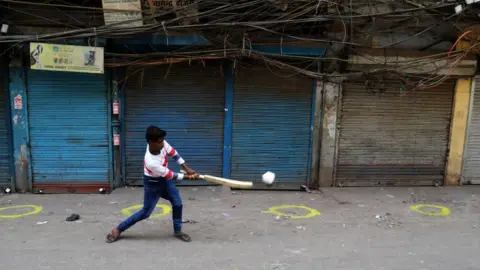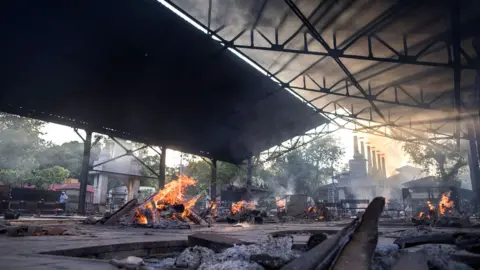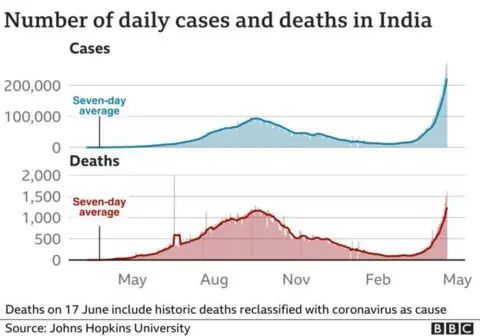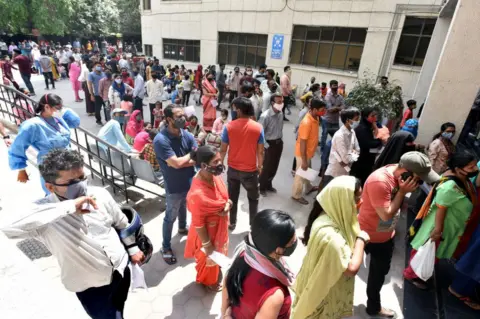Covid: Delhi announces lockdown as India's cases surge
 Getty Images
Getty ImagesIndia's capital, Delhi, has announced a week-long lockdown after a record spike in cases overwhelmed the city's healthcare system.
Government offices and essential services, such as hospitals, pharmacies and grocers, will be open during the lockdown, which starts on Monday night.
The city had imposed a weekend curfew, but reported its highest single-day spike so far on Sunday - 24,462 cases.
India has been reeling from a deadly second wave since the start of April.
Delhi Chief Minister Arvind Kejriwal said the city had almost run out of beds at hospital intensive care units (ICUs) and that oxygen was in short supply.
"I have always been against lockdowns, but this one will help us amplify the number of hospital beds in Delhi," he told a virtual press conference on Monday.
He also appealed to the city's migrant workers not to leave - last year's national lockdown saw millions of them heading back to their villages after they found themselves unemployed and running out of money.
"This was a difficult decision to take but we had no other option left," Mr Kejriwal said. "I know when lockdowns are announced, daily-wage workers suffer and lose their jobs. But I appeal to them to not leave Delhi. It's a short lockdown and we will take care of you."
 Getty Images
Getty ImagesCrematoriums in the area are also overwhelmed, reports the BBC's Rajini Vaidyanathan in Delhi. Distressing images showed bodies being burnt on the pavement, outside one on the outskirts of the capital.
One in three people in Delhi is testing positive.

Lockdown rules:
- Religious places are allowed to open, but cannot accept visitors
- Only 50 people will be allowed at weddings and up to 20 people at funerals
- Shopping centres, cinemas, restaurants, public parks, gyms and spas will remain closed during the lockdown
- All social, political and religious gatherings have been banned
- Sporting events without spectators are allowed
- Public transport like buses and the metro will function with up to 50% seating capacity
- Students appearing for examinations with valid documents will be allowed to travel
- Home delivery and takeaway food made by restaurants will be allowed
- People travelling for Covid-19 vaccinations or testing will be allowed if they have valid documents



India's health ministry has announced it will open its Covid-19 vaccination drive to all adults from 1 May.
"In a meeting chaired by [Prime Minister] Narendra Modi, an important decision of allowing vaccination to everyone above the age of 18 from 1 May has been taken," it said in a statement quoted by the AFP news agency.
More than 273,000 cases of coronavirus have been reported across India - with more than 1,600 deaths - in the last 24 hours.
India has been reporting more than 200,000 cases daily since 15 April - well past its peak last year, when it was averaging around 93,000 cases a day.
On Monday, UK Prime Minister Boris Johnson cancelled a planned trip to India in view of the situation. Mr Johnson and Mr Modi will speak later this month to "launch ambitious plans for the future partnership", a statement said.
UK Health Secretary Matt Hancock also announced on Monday afternoon that India had been placed on the country's travel red list, which means people who have been in India in the last 10 days cannot enter the UK.
Former Indian Prime Minister Manmohan Singh has been admitted to hospital after testing positive for the virus, Indian media report.
 Getty Images
Getty ImagesMaharashtra, which has India's financial hub Mumbai as its capital, remains the worst-hit state, accounting for nearly a third of India's more than 1.9 million active cases.
But Delhi is the worst-hit city, confirming more cases daily than Mumbai in recent days.
Hospitals are struggling to accommodate Covid-positive patients in Delhi and other badly hit cities such as Mumbai, Lucknow and Ahmedabad. Several states have been reporting an acute shortage of beds in Covid wards and ICUs.
Even test results are being delayed because of overwhelming demand, which, doctors say, is leading to people not getting diagnosed and treated in time.
Experts say the Indian government ignored warnings of a second wave and did little to prevent it or even contain it - they point to cricket matches attended by unmasked crowds, massive election rallies that appeared to flout basic Covid safety rules, and a huge Hindu festival where millions congregated on the banks of the Ganges river earlier this month to take a holy dip.
Buoyed by a sharp dip in case numbers and the start of the vaccination drive, India began the year on what appeared to be a normal note. But things soon took a turn for the worse as people began leaving home more, wearing masks less and socialising in larger groups. The entry of variants and a lag in the vaccination drive only drove up infections further, experts say.
Within weeks, India shot to the top of the world's Covid chart, recording more cases daily than any other country.
